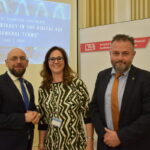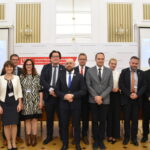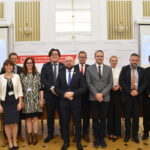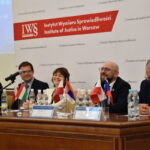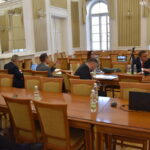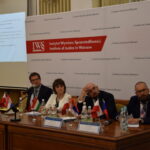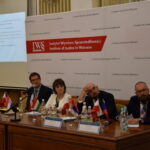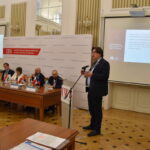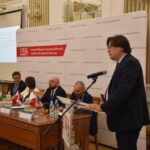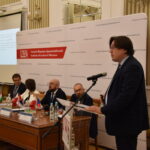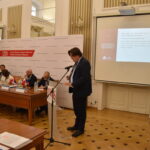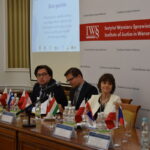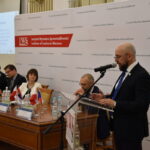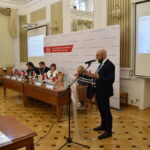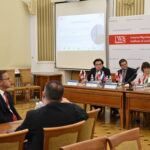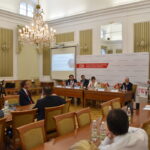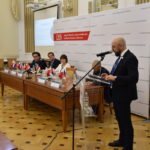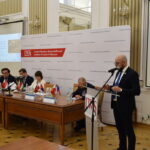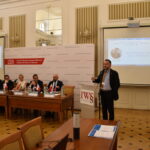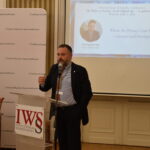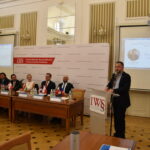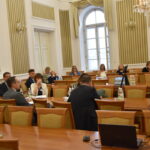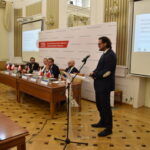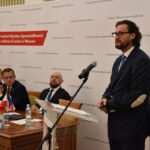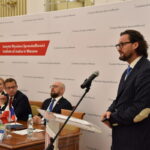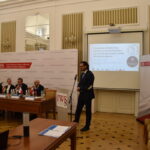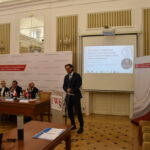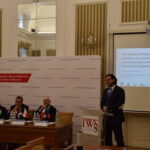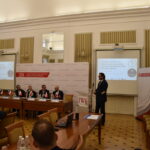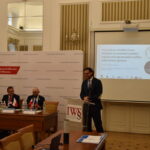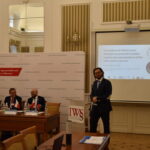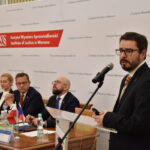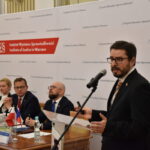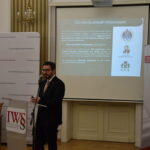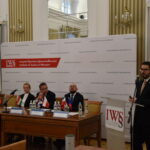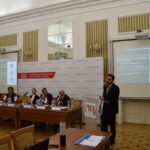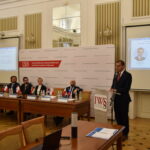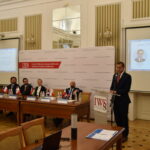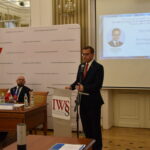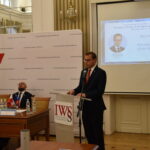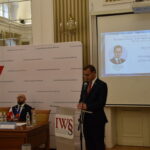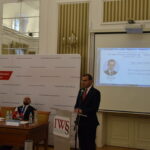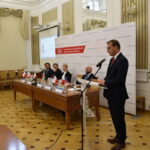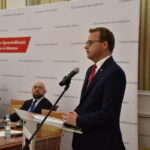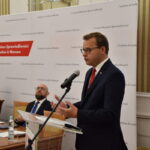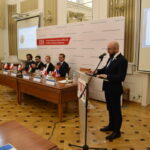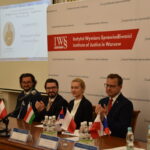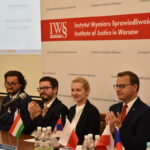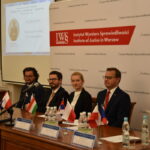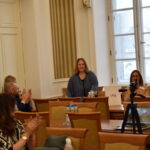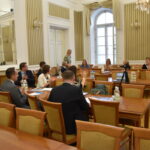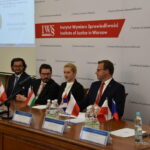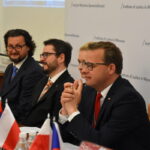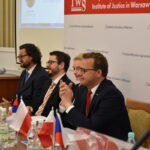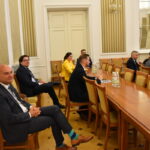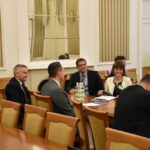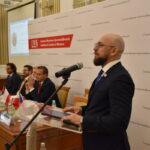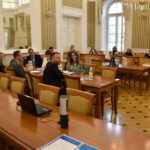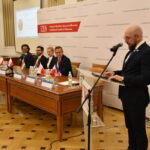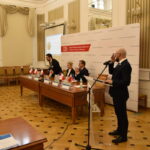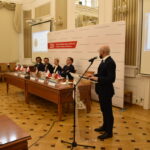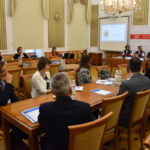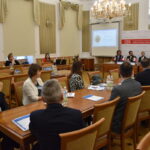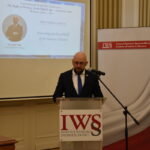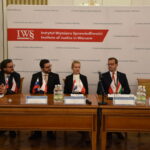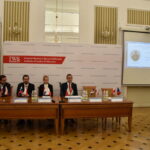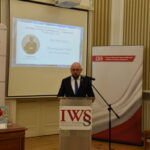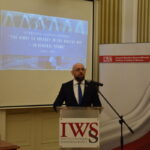International Scientific Conference entitled. “The Right to Privacy in the Digital Age – in general terms”
2022-08-01
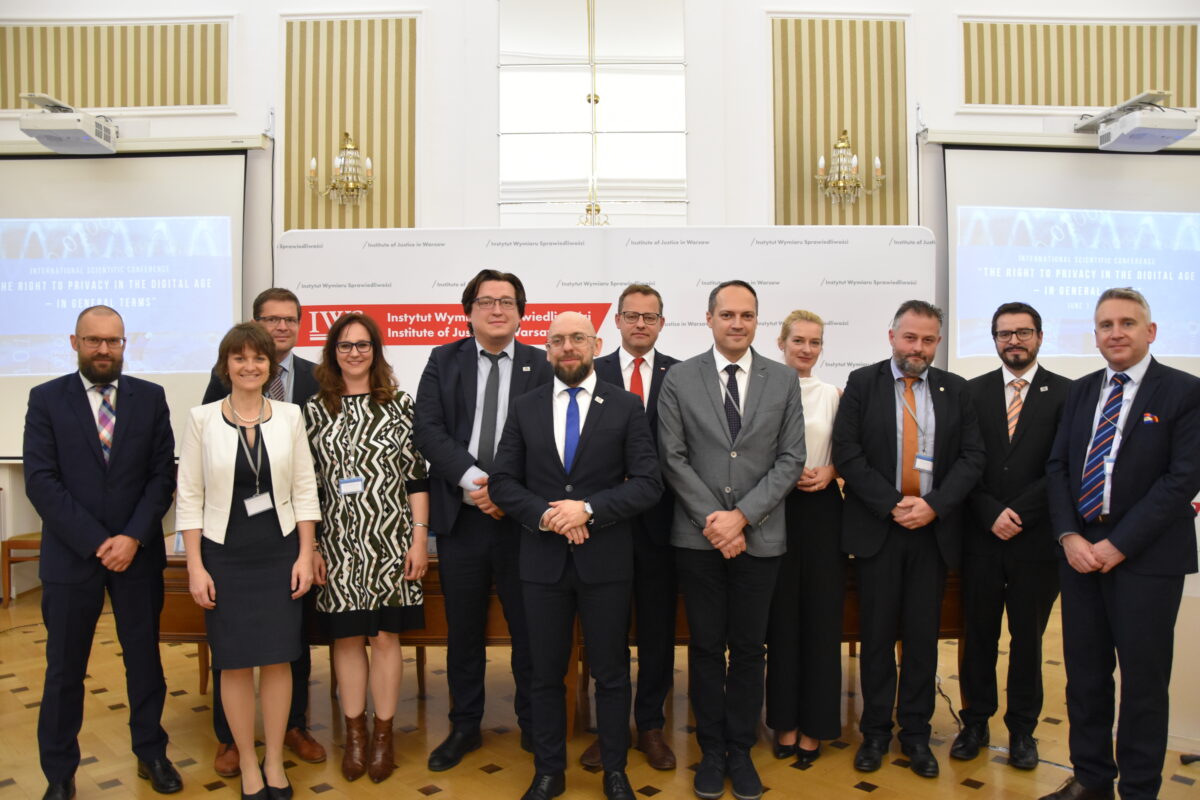
On June 1, 2022, the Institute for Justice hosted an International Scientific Conference entitled. “The Right to Privacy in the Digital Age – in general terms”. The event was organized within the framework of the Central European Professors’ Network 2022 research project, which is being implemented in the field of comparative law from January 1, 2022, with the active participation of experts from seven Central European countries (i.e. the Czech Republic, Croatia, Poland, Hungary, Serbia, Slovakia, Slovenia).
The thematic scope of the conference focused on current issues related to the right to privacy and the spread of new technologies, as well as the development of the information society. During the deliberations of the conference, attention was paid, in particular, to the current challenges and problems facing the right to privacy in the era of socio-economic changes that have occurred over the past decades due to the digital revolution. The conference included a discussion of current issues related to the right to privacy and the development of new technologies, as well as the formation of the information society. The deliberations of the conference revealed universal standards on the right to privacy, but also the problems faced by legislators and the judiciary of Central European countries. Particular attention was paid to establishing the limits of the right to privacy, as well as ensuring effective legal protection mechanisms possible to introduce into national legal orders. The conference presented challenges and legal solutions operating in Central European countries, including Poland, the Czech Republic, Slovenia, Serbia, Croatia, Hungary, as well as Slovakia.
Distinguished practitioners and scholars specializing in the protection of human rights, civil law, criminal law, criminal procedure, administrative law, thus a number of representatives of different legal branches, spoke at the event, which will ensure that the context of the right to privacy is expanded to other areas of law, so that the entire spectrum of the problem is shown.
The event was solemnly inaugurated by the Director of the Institute of Justice, Prof. ucz. dr. hab. Marcin Wielec. The Director warmly welcomed everyone to the conference and expressed his thanks that so many distinguished specialists had accepted the invitation to Warsaw to deliberate on the right to privacy in its broadest sense. In his speech, Professor Wielec also explained what the Central European Professors’ Network 2022 research project is, within the framework of which the conference was organized. The research groups of the Central European Professors’ Network began their activities in January 2022. The Central European Academy, with the active participation of seven countries (Czech Republic, Croatia, Poland, Hungary, Serbia, Slovakia, Slovenia) and 36 principal investigators, organizes comprehensive international scientific activities in four research groups. The main framework issues are: “Right to Parental Responsibility,” “Right to Privacy,” “Constitutional Protection of National Symbols,” and “Protection of Future Generations and the Environment.” The partial and final results of the cooperation, will be shared by each research team on various professional platforms, including conferences, and in the form of publications (scientific articles and books summarizing the research results). As a result of the activities undertaken, the Academy is confident that, in addition to improving the quality of national legislation, it will be able to create and support a universally recognized professional network covering Central European countries. The primary goal of the initiative is to create and organize a Central European professional network through closer partnerships.
The opening part of the conference was attended by Undersecretary of State at the Ministry of Justice Dr. Marcin Romanowski.
Marcin Romanowski holds a doctorate in legal sciences. During his professional career he was: Director of the Justice Institute (2016-2019), Plenipotentiary of the Minister of Justice for Informatization and Cyber Security and the Justice Fund (2018-2019), expert of the Parliamentary Commission of Inquiry to Investigate Allegations of Corruption Cases Revealed in the Media During Work on the Amendment of the Law on Broadcasting (2003-2004) and co-author of the report prepared by this commission, and in 2005-2007 and 2015-2019 – advisor to the Minister of Justice. In 2008, he defended his doctoral thesis on “Property in the process of settling the communist past.
He said that scientific cooperation in Central Europe is important and worth working on, especially since the common legal tradition of Central European countries is based on Christian roots. Cooperation within the Central European Professors’ Network allows discussion of urgent topics and directions in which the law in Central Europe should go. The Undersecretary of State noted two elements that are important in such cooperation – the selection of the area of law that requires urgent discussion and the selection of the group of experts. He acknowledged that, speaking of the Central European Professors’ Network, these two goals have been achieved.
After the opening of the conference and a welcome speech on behalf of the Polish Ministry of Justice, conference participants listened to a welcome speech on behalf of the Central European Academy, delivered by Dr. Katarzyna Zombory – Director of the Central European Academy.
Katarzyna Zombory was appointed Director General of Miskolc University – Central European Academy in January 2022. She was previously a senior research fellow at the Ferenc Mádl Institute of Comparative Law in Budapest. She holds a law degree from Maria Curie-Sklodowska University in Lublin, as well as courses from the Centre Européen Universitaire de Nancy, the Hague Academy of International Law, Leiden University, and the Catholic University of Pázmány Péter. She holds a doctorate in public international law, and her current research field focuses mainly on international human rights law and international cultural heritage law.
Dr. Zombory thanked the experts for working together on the project. The main goal of the Central European Academy is to create an academic network of legal experts who represent a young research perspective. The theme of the conference is the right to privacy and the assumptions and challenges of this right in the digital age.
The next speaker was Prof. János Ede Szilágyi, who thanked the previous speakers and introduced the Central European Junior Program. This project focuses on junior research and has important connections with the senior program. The project has four potential links between these focused communities – CEA PhD students/interns, PhD supervisors, PhD textbooks and institutional collaborations. The professor comprehensively described each element of this program. Students in this program have a great opportunity, for example, to actively organize and participate in international conferences and other scientific events. It is also an excellent opportunity for doctoral students by providing insight into research and publication processes on various topics in comparative law.
János Ede Szilágyi is a professor at the Faculty of Law at the University of Miskolc and head of the Department of Agricultural and Labor Law at the Faculty. He is director of the Ferenc Mádel Institute of Comparative Law in Budapest. His scientific activities are associated with several international and national academic organizations and scientific journals. He is a member of the Board of Directors at the European Public Law Organization and Deputy Delegate for the Board of Directors of the Comité Européen de Droit Rural. He is editor-in-chief of the Central European Journal of Comparative Law, the Journal of Agricultural and Environmental Law and Law, Identity and Values.
After the presentation of the Central European Junior Program by Prof. Szilágyi, Dr. Grzegorz Ocieczek, who is Assistant Professor in the Department of Criminal Procedure at the Faculty of Law and Administration of Cardinal Stefan Wyszynski University in Warsaw, appeared as a special guest. Advisor to the National Prosecutor. Retired prosecutor of the National Prosecutor’s Office. Former Deputy Head of the Internal Security Agency, Director of the Department of Criminal Procedure of the Internal Security Agency in Warsaw and former Head of the District Prosecutor’s Office Katowice Centrum-Zachód in Katowice. Former Deputy Head of the Central Anti-Corruption Bureau. Member of the European Commission-initiated Polish Platform for Homeland Security (PPHS), whose tasks are to create advanced, integrated technological tools to support the activities of law enforcement agencies and the judiciary. Participant in the International Visitor Leadership Program organized by the U.S. Department of State on combating crime and terrorism. Author of publications on organized crime and crown witnesses.
In his presentation, which was entitled “Analysis of the institution of the crown witness in the context of the right to privacy,” he analyzed the institution, which was the starting point for further discussion of the issues of the crown witness and the right to privacy. Dr. Ocieczek referred to the effect he achieved through his research on the institution of the crown witness. He pointed out the distinction in Polish legislation between small and large crown witnesses. The right to privacy in the case of a crown witness was described in light of questioning in criminal proceedings, but also in light of the reasons why an accused decides to become a crown witness. Speaking of reasons, he pointed to six reasons that can influence the decision. One of them is the family situation, and another is the crown witness protection program. Dr. Ocieczek then described the cooperation of a crown witness in the context of the right to privacy. In connection with his research, Dr. Grzegorz Ocieczek issued his own academic publication entitled. “Crown Witness. Assessing Credibility,” in which he expanded on the topics of his lecture.
First Panel
During the conference, there was an opportunity to hear a speech by Prof. Vanja-Ivan Savić of the Univeristy of Zagreb, Croatia, whose presentation was entitled “Whom do the Privacy Laws Protect? – Concepts and Developments.” Prof. Savić devoted the speech to a consideration of the subjective scope of privacy laws. In view of this, he also spoke about current concepts, but also about the development of this institution. He considered whether it is possible to talk about corporate privacy and the right to privacy. The right to privacy is a topical issue due to the popularity of social media, where everyone posts every aspect of their lives. For this reason, it is important to consider who is protected by the right to privacy and whether this right can be enforced in the 21st century. In his lecture, he asked what values are currently protected by society in the area of the right to privacy. It seems that the main values are security, individual freedom, and privacy. Summing up his speech, Prof. Savić referred to the historical process of change in the right to privacy from societies where the community was the main value to the individual and his rights.
Professor Koltay András of the University of Public Service and the Catholic University of Pazmany Peter was the next speaker at the international academic conference “The Right to Privacy in the Digital Age – in general”. He presented on the protection of the private sphere in Hungary and freedom of expression. Prof. András presented a view of the laws that allow the protection of the private sphere and freedom of speech in Hungary. His lecture was coordinated within the framework of data privacy, protection of private information.
Another speaker at the conference was Professor Matija Damjan from the University of Ljubljana in Slovenia. The professor presented a speech entitled “The protection of communication privacy of legal entities – Slovenian view.” This gave participants the opportunity to hear and learn about the communication privacy of legal entities in the Slovenian legal system, which was particularly interesting in light of the earlier – Hungarian – perspective. The professor told the conference participants how the protection of communication privacy is regulated by constitutional provisions and how these provisions can be used for legal entities. The issue Professor Damjan discussed was also divided into two parts – the inner circle of privacy and the outer circle of privacy. In the outer circle of privacy, free economic initiative is not unlimited. The state can set conditions for economic activity in order to protect other constitutional values. In the inner circle of privacy, on the other hand, the same conditions apply as in the case of a search of an individual’s home. The agency’s decision is not sufficient in the context of the right to privacy.
After the Hungarian and Slovenian points of view, another perspective on privacy protection was presented by Prof. Marta Dragičević Prtenjača of the University of Zagreb, who spoke about the right to privacy and its protection in contemporary Croatian criminal law. The professor presented general data, statistics and her personal research results on the right to privacy in criminal law, but also on the growing number of convicted persons. In Croatia, there are a number of legal acts regulating the privacy of convicts, one of which is the Croatian Constitution. Prof. Marta Dragičević Prtenjača, told the event’s participants about the individual’s right to privacy in criminal law, which was an excellent complement to the previous speaker’s presentation on legal entities. This gave participants the opportunity to learn more about both sides of this right and have an overview of the situation in two different legal systems. The most common crime is the unlawful use of personal data, but also the violation of the inviolability of housing and business premises. Finally, the Professor appealed for caution when it comes to personal data and its protection. This is extremely important especially from the point of view of criminal law.
Professor Dušan Popović of the University of Belgrade presented a speech on privacy and data protection in Serbian law. He also highlighted challenges in the digital environment related to privacy and data protection. The collection, storage and use of personal data in Serbia is strictly regulated and protected. One of the issues addressed by the speaker was the right to respect for privacy and family life and the protection of correspondence. Each aspect of these rights was described based on legislative solutions in Serbia. A concise presentation of the issue of the right to privacy in the context of civil and criminal law was certainly a valuable addition. Two areas that require additional legislative and executive action are the lack of regulation of mass surveillance by specific standards, and the Professor’s attention to the need to strengthen mechanisms for protecting children’s privacy in the digital environment.
Second Panel
The conference also featured as a speaker the Director of the Justice Institute – Prof. Marcin Wielec of Cardinal Stefan Wyszynski University, who spoke about the realization of the right to privacy in Polish criminal proceedings. He considered this topic using the example of the secrecy of confession. Prof. Wielec pointed out that privacy has certain characteristics, such as autonomy, independence, intimacy, naturalness. He argued that at some point the right to privacy in criminal law may be eliminated, because criminal procedure is a complex mechanism in the implementation of ius puniendi – the state law of punishment. Criminal procedure is full of institutions that can violate the right to privacy. During the speech, Prof. Wielec asked the question – “where is the right to privacy in criminal proceedings?”. In this area it is necessary to find a kind of balance. An appropriate example in the search for an answer to the question posed earlier turned out to be the characteristics of the institution of the secrecy of confession. The prohibition arising from the secrecy of confession makes it possible to ensure the right to privacy in criminal proceedings. The speaker explained that the right to privacy relates to emotions, and confessional secrecy is the best example of this because of the relationship and trust between the confessor and the penitent.
The conference also included a lecture by Prof. David Sehnálek of Masaryk University, whose talk was entitled “Current Problems of the Right to Privacy in the Czech Republic.” Participants had the opportunity to learn how the right to privacy is regulated in the Constitution of the Czech Republic. The problematic aspects in the legal system of the Czech Republic begin with the definition of the term “privacy,” which Professor Sehnalek explained in detail during his lecture. He also focused on personal data on the criminal side of the right to privacy by referring to the Code of Criminal Procedure. The most topical aspect of the speech concerned the right to privacy during the Covid-19 virus pandemic and the problems generated by this emergency situation.
Professor Katarína Šmigová of Pan-European University in Bratislava was the next speaker at the international scientific conference. During her speech, Prof. Šmigová told conference participants about the challenges of the right to privacy in the digital age in the Slovak Republic. The professor drew attention to the very rapid digitization of social life and the development of cyberspace and cyber-security in the transmission sense. This clearly generates regulatory problems in the Slovak Republic, as in other countries. An important aspect highlighted by Prof. Smigova was that problems with the right to privacy can be dealt with on various levels – constitutional, civil, as well as on the basis of regulations relating to children and their protection. One of the many aspects was unauthorized monitoring, for example, in the Laboure Code – the possibility of controlling employees, the means and forms of control. The main thesis of the speech was that Slovak legislation is too slow and late for this changing area of law.
The last speaker was Bartlomiej Oręziak, MA, from Cardinal Stefan Wyszynski University, who is also the coordinator of the Center for Strategic Analysis of the Justice Institute. His presentation dealt with the legal aspects of the right to privacy from the perspective of the Republic of Poland. As the keynote speaker, Mr. Oręziak chose to talk about cyberspace and its regulation, so it was possible to compare regulations and the problems they generate. Participants were able to hear about the right to privacy in light of the Polish Constitution. The speaker also emphasized the role of the Polish Constitutional Court, which stated that there are two subjective rights that relate to the right to privacy in one provision. Constitutional relations are the most important for guaranteeing human rights and freedoms. The constitutional aspect was not the only aspect in this speech. The right to privacy can also be enforced and ensured on the basis of civil law, as it is one of the personal goods of a person. According to the speaker, civil laws can be successfully applied in the cyberspace environment. He also pointed out the most pressing problems in the application of these laws, such as the anonymity of cyberspace users, as it is difficult to establish their personalities. The second huge problem is the difficulty of determining the applicable law, which is related to the third problem – jurisdiction. It is difficult to determine the jurisdiction of a cyberspace user. After describing the constitutional and civil points of view, the speaker briefly mentioned the criminal-legal and administrative-legal aspects of the right to privacy in cyberspace.
Closing remarks
Both panels of the conference were followed by a wide-ranging discussion, where speakers were able to share their insights and ask about interesting issues. After the first panel, the question arose whether in Poland anyone can be a crown witness and in what type of crime one can become one. The answer was provided by special guest Dr. Grzegorz Ocieczek, who explained that the status of a crown witness can only be granted for crimes committed as part of an organized criminal group. He also explained the reason for such a provision. Another question was about artificial intelligence and how we can trust robots that collect personal data. The answer is that we cannot be sure that we can trust those who have our personal data, but we must rely on the state, which must ensure protection and security. When it comes to legal entities and their collection of personal data, we don’t know who exactly is collecting and storing this data – is it a manager or an employee of the company? This is a huge topic that could be considered at another research year and conference.
The last question concerned the court’s position on whether DNA can be collected, stored and used in a trial in the Czech Republic. Professor Sehnalek said that if the police carefully justify the reasons for collection and use it in a proportionate manner within a limited scope, DNA can be collected legally.
At the end of the international scientific conference “The right to privacy in the digital age – in general”, Prof. Marcin Wielec – Director of the Justice Institute thanked all conference participants for their participation in the meeting and in the discussion.



